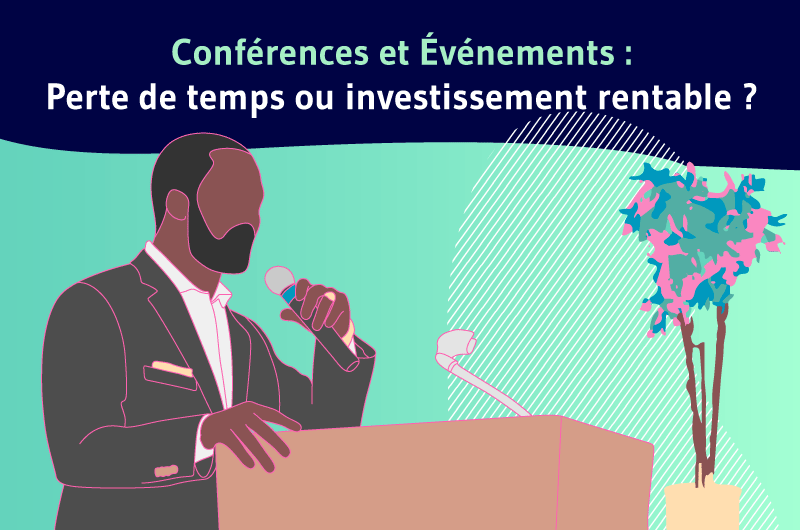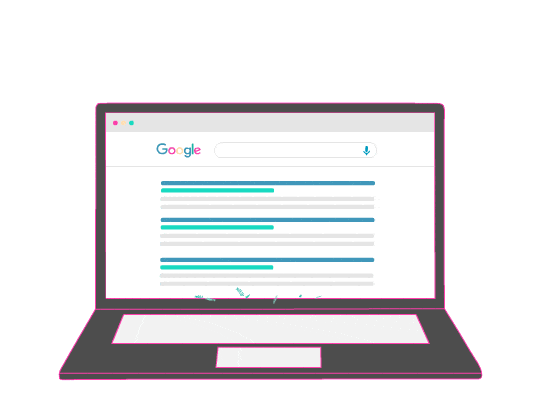In the United States, more than 1.8 million trade shows, conventions, incentive events and other gatherings take place each year. A phenomenon that is all the more astonishing given that the development of technology could call into question the need to participate in such events. But if the event marketing is still in vogue, it is probably because it has certain advantages. Time is money and there is nothing worse than going to a conference that doesn’t add value to your business. It doesn’t matter if you pay admission or attend a conference for free, the goal is toget a return on the time and money invested to go to the event. For this reason, I have put together this practical guide and video to show you what benefits such events can bring, the criteria for judging the relevance of a conference and tips on how to get the most out of it.
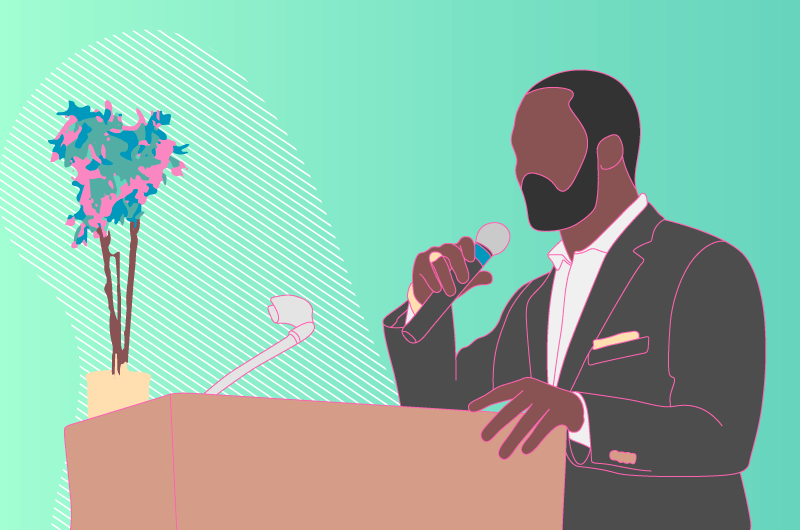
Conferences and events
In this video, I propose to present you my position on the usefulness / uselessness of going to conferences :
https://youtu.be/nzh0hmXdENU
Find in my Google Slides presentation the different elements I could mention about events and conferences:
Attending a conference: What are the benefits?
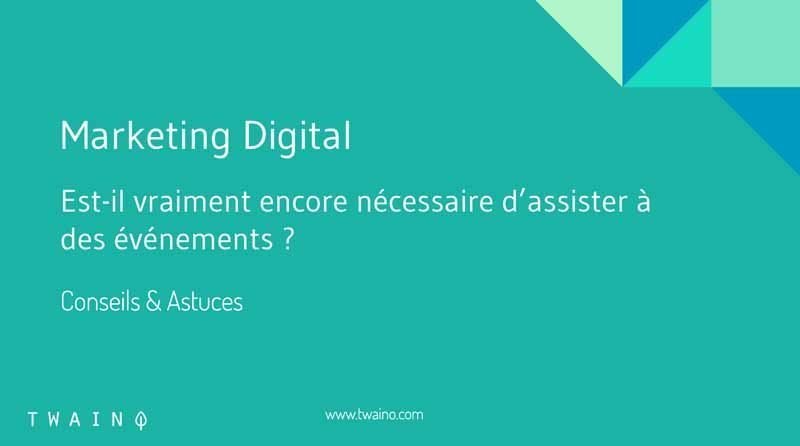
The benefits of attending an event or conference generally depend on your profile.
1. As a visitor
As a visitor, you will:
1.1 Enrich your knowledge or learn new things
This is obviously the most obvious reason to attend a conference. Conferences are places where you have the opportunity to capitalize on the experience and knowledge of the experts.
1.2. meet the experts
If you want to easily connect with experts in your field, conferences are the best places. These meetings can allow you to learn from their experiences and gain a deeper understanding of the issues in your industry.
1.3. Develop your network
Whether it is personal or professional goals that you wish to achieve, it is always very interesting to exchange on practices in a market. For example, when you know a real estate professional personally, it will be much easier and more convenient for you to acquire an apartment since he or she will help you in different ways
Knowing the right person can help you to achieve some of your some of your objectives.
In fact, such an event allows you to create new relationships with people who are likely to work in similar fields and share the same interests as you.
2. A sponsor with a business ambition
When you are a sponsor, a conference or event allows you to:
2.1. Represent your product and brand
When well thought out, sponsoring an event can be a great strategy. In fact, sponsorship allows your brand todirectly reach a highly qualified audience. But if you’re not the only sponsor, consider really showcasing your product and brand.
2.2. Talk to potential customers
When you sponsor businesses, you have the opportunity to get your message directly to people who might be interested in your products. In addition to increasing your brand awareness, you build trusting relationships with potential customers.
2.3. get customer feedback
You can do like some companies that allow participants to try the free version or samples of their product in exchange for feedback. By doing so, you get very useful information that allows you toimprove your products or services.
3. Speaking as a speaker
When you speak at conferences, you reinforce your credibility by proving your expertise. When you add value to your listeners they are likely to be much more receptive when they come across your content or brand in the near future.
In addition, you are establishing your authority among other experts as you become more known in your industry.
The eternal question of return on investment: Determine if an event is worth your time!
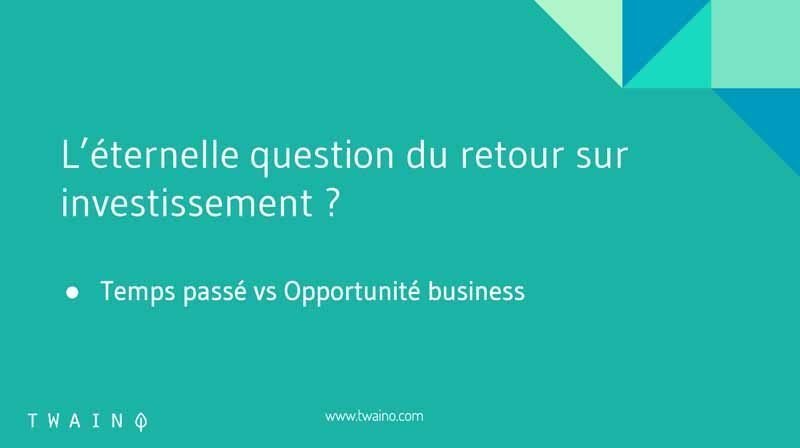
It’s very easy to get caught up in the hype of a conference, especially when its promoters promise a great deal of networking and exposure for each attendee. Who doesn’t love a room full of investors, potential buyers or partners?
Unfortunately, these events are not always what they are cracked up to be. It can be really hard to distinguish the ones that are worth attending from the ones that are better left alone.
I give you the 3 tips to determine which events are the most profitable.
1. Understand the participant’s profile
When you want to attend events, make sure they fit your customer profile and your needs. In fact, depending on the stage of your project, you will be interested in networking with different audiences. The first distinction to make is whether you have a more B2B or B2C audience.
For example, if you have a startup in a given field, not all major trade shows related to your sector will be relevant to you. Indeed, there are many events where the people present are mostly consumers. If your sales are focused on the B2B market, it will not be ideal for you to attend these events or seminars.
Similarly, if you have a B2C product or service, but are looking for startup funding, a profile of attending a small investment conference with an investor audience is more desirable.
Choose conferences that will put you with your ideal audience should always be the first criterion to ensure you get the best ROI for your time and investment.
Also, check the level of presentation at events. In other words, find out if it is for novices or experts. This will also help you avoid wasting your time with concepts that you may already know.
2. Look at the numbers
Many conferences are advertised with impressive statistics. And presenting your products or ideas to 15,000 people may seem like an opportunity not to be missed. But these numbers can be misleading and you need to take the time to analyze it more closely.
15.a conference can have as many as 1,000 people in attendance, but be aware that this is a total number, which means that there will be 15,000 participants over two or three days.
Over the three days, you can assume that there will be about 5,000 participants per day. This is still a significant number, right? The answer is obviously yes, but let’s go a step further.
The promoters of the conferences or events do not have the same conception of the customer as you do. Let me explain, if there is a family with two children that represents four different people for the promoters, but for you, this group only counts as one client.
In the end, you only have 1,250 people per day spread out in a large room. Also, don’t be surprised if the event has fewer people advertised, which can also reduce the number of attendees you’ll be able to reach.
Of course, this is an estimate, but it is a good example of what usually happens.
3. Study the conference organization and schedule
Even when you find a conference that connects you with influencers in your industry and has a proven track record of attendance, the results you are looking for are not always guaranteed.
One hidden factor that is important is the organization and scheduling of the event or conference. Ask yourself questions such as:
- How is the event structured?
- Who are the speakers and how popular are they?
- Are there breakout sessions, main stage lectures?
- Is there a scheduled exhibit date?
- Etc..
There are conferences that have fantastic attendance, but attendees can’t find time between keynotes. This does not allow for comfortable browsing of the exhibit space.
If you invest in a booth to display your products, make sure there is enough time for attendees to visit the exhibit and chat with you.
These different tasks may take a little longer, but if you do them before you take a day off, leave your business or book your flight to a conference, you will save a lot of time and money.
How to get the most out of a conference?
You’ve decided to attend an event since it seems to be beneficial to your goals. It’s time to attend your event and get the most out of it.
The pre-conference checklist of things to do
1. Review the program
It is true that you analyzed the program when you were assessing the relevance of the conference, but it is always useful to do so again. This time, you will use the event program to make plans based on the objectives you want to achieve.
At this point, think about how you will manage your time and what you would like to learn. Perhaps there are several presentations and one or two are more than enough for you. Don’t try to attend every section if you’ll end up tired and won’t be able to enjoy the event.
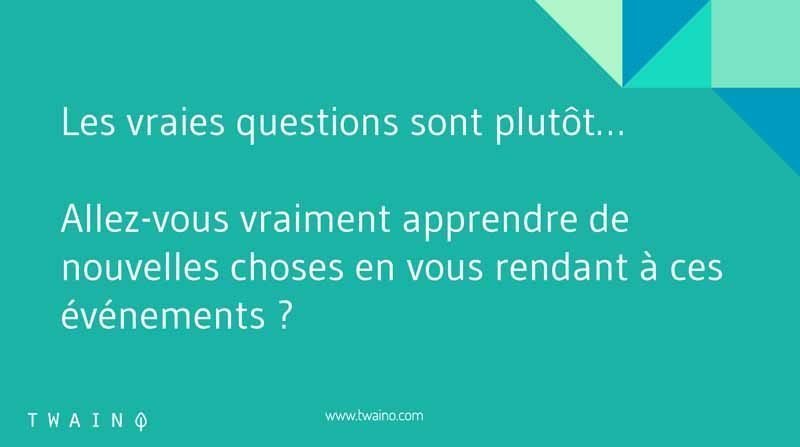
2. Familiarize yourself with the venue
Determine exactly where the conference will be held and study the map if necessary to avoid getting get lost on the day of the conference. Showing up late definitely does not make a good impression.
3. Gain visibility
A great way to maximize your experience is to actively participate in some way in the event. For example, as a speaker, session leader or committee volunteer.
Check the conference program already to see if these options are available, or email the conference organizer directly to ask.
While you’re there, you’ll be among hundreds or thousands of other attendees, but if you can take on a visible role, it’s an easy way to stand out from the crowd.
4. Build stronger relationships
A conference is an opportunity to meet new people, but it’s also an opportunity to build on relationships you already have.
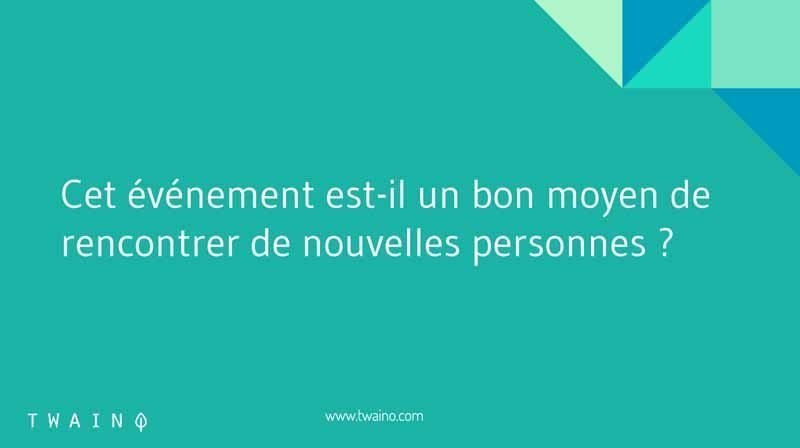
If you know people you want to reconnect with or get to know better, such as clients or partners, make an appointment a few weeks before the conference to have coffee or lunch while you are at the event.
During the event: The 3 rules to know
1. Choose the right sessions
At most conferences, there will be several sessions from which you can choose the ones that seem to be most beneficial to you. When you are plan your schedulewhen planning your schedule, take a look at the conference as a whole
Look at all the sessions and events that interest you, then make sure you attend a variety of topics, skill-building sessions and social activities, while still allowing time for rest.
And if you find yourself in a session that isn’t quite what you thought it was going to be, don’t shy away from switching sections. To be successful at your conference, you need to use your time wisely and make the most of everything in it.
2. Take notes
With days full of speakers and sessions, there is a lot to take inand you probably won’t remember everything when you get home. Therefore, take notes in a way that will allow you to access them easily when you return to the office.
Regardless of the note-taking format you choose – pen and paper, laptop, tablet… – at the end of each session, make a recap. This will help refresh your memory and give you ideas for specific things to do when you return to work.
3. Put your smartphone away
You’re at a conference to have interactions from other people, and it wouldn’t be good if your devices were a obstacle to making those connections
So while you don’t have to disconnect completely, put the phone away when you start a workshop or take a break at the coffee shop. This gives you a chance to start conversations with the other participants around you.
During the event: 6 Tips for making new connections at conferences
1. Have business cards
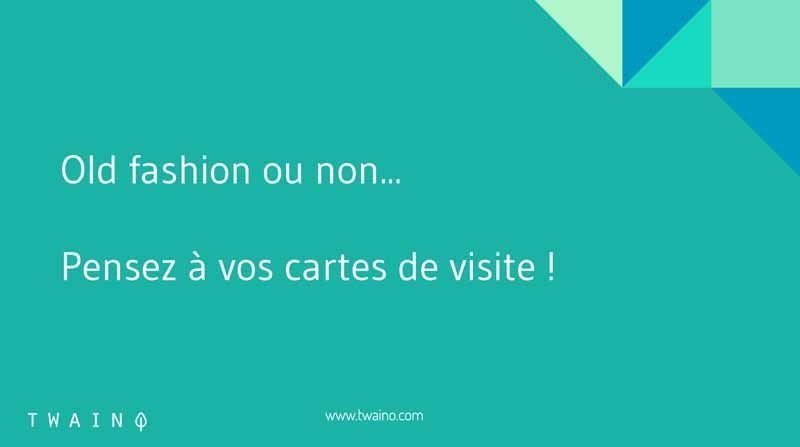
With today’s level of technological development, it seems old-fashioned to still brandish business cards. But this is a big mistake when it comes to attending conferences
If you don’t make it easy to connect with people, no one will do it for you. If you plan to attend an event, make sure you bring lots of cards.
Beware though, it’s not very nice to just hand out a business card and walk away. You need to be able to carry on a good conversation before you try to exchange business cards.
2. Come up with a powerful opening sentence
Just because you have business cards doesn’t mean you’re ready to attend a conference. Before you start mingling with others, you need to come up with one or more ideas for introductory phrases
This is especially effective when you’re a bit shy and have trouble starting a conversation. To make sure your opening line works well, make sure it consists of the following elements:
- Your name;
- What you do;
- Why you are here.
Do not exceed 30 seconds to introduce yourself and make sure your presentation is relevant to the conference you are attending.
For example, for a conference based on the SEO theme, I might say:
” Hello, my name is Alexandre MAROTEL. I am the founder of Twaino, an SEO Agency agency that helps companies increase their visibility and conversions on search engines with natural referencing. I’m here to share good SEO practices. “
” Hello, I am Alexandre MAROTEL. I’m an SEO expert and I help companies to get better rankings on search engines. I’m here to find startups or companies that need help with their internet marketing efforts “
” Hello, I am Alexandre MAROTEL. I am the founder ofTwaino SEO Agency which brings practical solutions to startups to improve their visibility on the web. I’m looking to help startups or companies that have the ambition to increase their visibility on the net. “
These different formulas can help you, but you have to make sure that they that they naturally integrate your different conversations without giving the impression of being mechanical.
3. Effectively target people to build a relationship with
What’s the point of meeting 200 people over the course of a day without really getting to know them? Don’t waste your time getting to know a large number of people. Focus on meeting high-quality individuals with whom you can build valuable relationships.
Examples include:
Speakers if you have the opportunity, meet all the speakers you listen to. However, don’t try to spend a lot of time talking with them because they are being hounded by hundreds of others. Personally, I have not yet had the opportunity to talk to a speaker on the spot, as they are far too busy;
The conference organizers it is wise to meet with the conference organizer. The organizers can get you into future conferences for free, and they know where the private after-parties are.
Competitors : Your competitors don’t have to be your enemy, and if you build a relationship with them, they can potentially refer clients to you.
Attendees: You should get to know them, but this happens naturally as long as you don’t get away from the crowd.
4. Don’t have lunch with your friends!
Most conferences offer a lunch/dinner/appetizer reception and while the food may not be great, avoid eating out. Not only do you have to have lunch at the conferencebut you should also sit at a table full of people you don’t know.
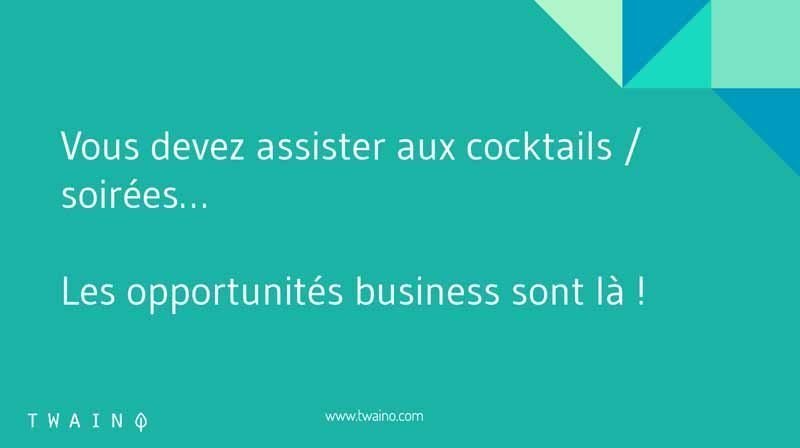
When you sit down, introduce yourself and participate in the conversation. You’ll be amazed at who you meet over a 30-minute meal.
5. Browse the exhibit areas
Most conferences have an exhibit area filled with sponsors and companies showcasing their services or products. Take at least an hour to visit the show and see if there are any companies that interest you. Even if you don’t buy anything, you can still get useful information from exhibitors.
On top of that, you can get free products and services that will help your business grow.
6. Invite some people to dinner
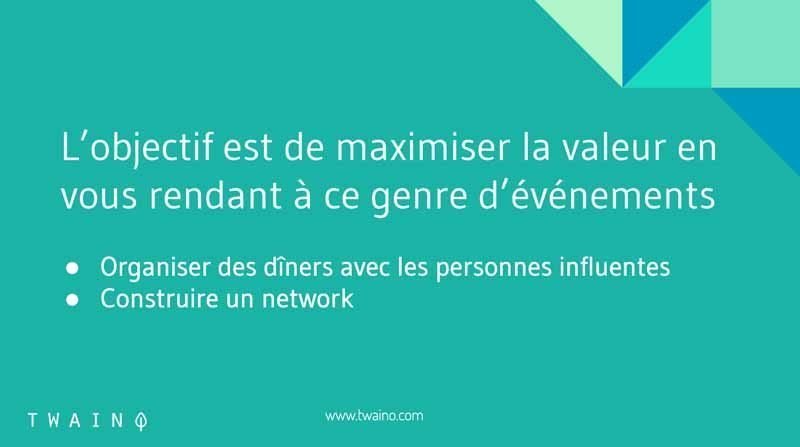
If you want to get to know someone a lot more, it is more effective to talk to them one-on-one. It’s hard to get to know someone well at a conference because you can easily be interrupted. Generally, most conferences give you a few hours for dinner.
Find someone you want to get to know personally and ask them to dinner. If they say no, move on to the next person.
During your dinner meeting, don’t just talk about business. Find out how they are doing and discuss what interests them. The idea is to put more emphasis on building a strong relationship.
Once dinner is over and the bill arrives, be sure to pay!
After the conference: Don’t forget to follow up
Meeting someone is great, but if you don’t get to know them personally, you’re not going to get any benefit from the relationship.
1. Follow up with friendship
At the conference, you collected business cards and/or had new friends on Facebook. Within a week of the event ending, send a personal message to everyone you met to let them know you enjoyed meeting them.
Also, set up a phone call or in-person meeting with anyone you want to do business with or build a relationship with. That said, be patient and don’t insist if some people don’t respond to your messages.
2. Build on what you learned at the conference
You gained a lot of new information as well as contacts at the conference, and one of the best things you can do with these resources is to share them with your colleagues and friends.
- Send videos of the sessions you found particularly useful;
- Give a talk about what you learned at your next staff meeting;
- Tell your supervisor about interesting contacts you’ve had.
In this way, you will really leverage the valuable resources that the conference or event gave you.
Conferences: An opportunity to be seized with care
Regardless of the stage of development of a company, having more visibility is one of the main objectives that never changes. To do so, there are several ways, both virtual and physical, such as participating in conferences or events. This is a particularly approach that is particularly effective when it is mastered as it can help you develop your network and acquire new knowledge. But attending events requires a minimum investment of time and money. This is why it is recommended to choose your conferences well and to adopt certain practices before, during and after the conference. This way, you can be sure to get a return on your investment that meets your expectations.
What events have you attended before and how would you like to do it next time?

